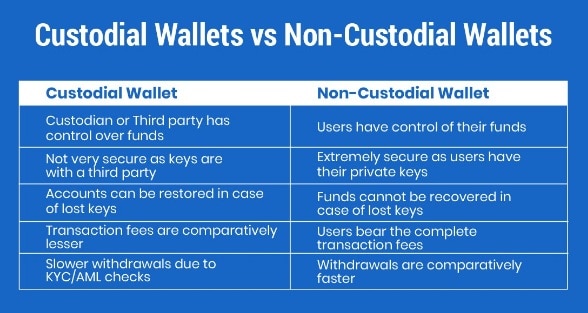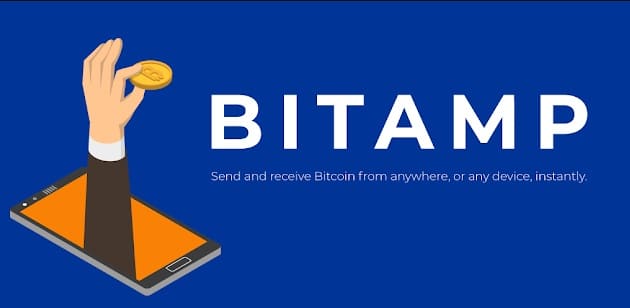Custodial vs. Non-Custodial Wallets: Which Is Better?
When it comes to cryptocurrency, there is no one-size-fits-all approach. Fortunately, users have options regarding which digital coins they want to invest in and whether they’re more interested in trading or mining.
However, one topic tends to spark fierce debates in the Bitcoin community – the Bitcoin wallet. The discussion primarily revolves around the question of whether custodial or non-custodial wallets are better.
Both have advantages and disadvantages worth considering. Before you open a Bitcoin wallet account, it’s imperative to know all the relevant information about the two types of digital wallets – custodial vs. non-custodial wallets.

What Is a Custodial Bitcoin Wallet?
The basic premise of a custodial Bitcoin wallet is that a third party controls the private keys. Essentially, users are placing their trust in another entity, usually crypto exchange platforms.
Many first-time Bitcoin investors have relied on a custodial wallet at some point. If you create an account with well-known exchanges such as Coinbase or Gemini, you’ll have an opportunity to utilise a custodial wallet. It’s all a part of their service.
They want to protect your funds and will make every effort to do so, as it’s in their best interest as well. Custodial crypto wallets are often called hosted wallets by users.
Undoubtedly, custodial wallets relieve users of personal responsibility for their funds. Some will see this fact as a plus and others as a major red flag. Furthermore, custodial wallets are typically web-based, which, unlike hardware wallets, require a continuous internet connection.
Advantages of Custodial Bitcoin Wallet
In the crypto community, custodial wallets don’t have the best reputation. But it’s not because they’re considered unsafe. It’s the fact that the user doesn’t hold their private keys and essentially isn’t in charge of their funds entirely. To some, this lack of control is unacceptable.
To others, it’s precisely why they appreciate custodial wallets. The private key is the only way to access the money you’ve earned, but what happens if you can’t remember it?
It means that your Bitcoins are lost forever. That doesn’t happen with a custodial wallet, as exchanges take precautions to ensure you never lose access to the fund.
In general, custodial wallets are also a safer option as they provide better security against malware and phishing scams when it comes to web-based wallets.
There are a few downsides worth considering too. First, some exchanges require you to use their wallets. And the fact that you don’t hold the private keys means they can take your assets if they choose to do so.
What Is a Non-Custodial Bitcoin Wallet?
With non-custodial wallets, users have complete control of their private keys and funds. Typically, when users accumulate considerable amounts of Bitcoin in their exchange accounts, they want to open a Bitcoin wallet account of their own.

Naturally, the presence of a third party is cumbersome when you become savvier about Bitcoin. However, in contrast to custodial wallets, where you had to trust the platforms that provide them, with non-custodial wallets, you have to trust yourself to keep them safe.
If you’re using hot wallets, that means being mindful about the security of your internet connection and the health of your devices. You might have to use a VPN service or backup your wallet with a recovery phrase, known as the “seed phrase.”
Advantages of Using a Non-Custodial Bitcoin Wallet?
The most prominent reason non-custodial crypto wallets are the more popular choice is that they give users freedom and control. Freedom to choose the wallet they want and full control of their funds.
That’s not an insignificant advantage, especially when we consider that the appeal of cryptocurrency revolves around the fact that it’s a decentralised system without third-party involvement. Furthermore, a non-custodial wallet is not exclusively web-based.
If you want better security and to manage your Bitcoins offline, you can choose a hardware wallet. Selecting a hardware wallet also means having full access to staking rewards from your holdings.
But the notable downside is that trading will be slower as funds need to reach the exchanges first. Plus, user interfaces are typically less user-friendly.
Relinquishing Control: Yes, or No?
There are plenty of arguments why custodial wallets are the prudent choice, especially if you’ve only started with Bitcoin. But the deeper you get into the matter; you’ll likely prefer having a non-custodial wallet.
Some users appreciate a helping hand from a third party, and others dread it entirely. When it comes to everything crypto-related, there really is no uniform approach. Custodial isn’t better than non-custodial and vice versa. Both are simply options that can play a role in your Bitcoin career.
source https://www.coinideology.com/custodial-vs-non-custodial-wallets?utm_source=rss&utm_medium=rss&utm_campaign=custodial-vs-non-custodial-wallets
Comments
Post a Comment